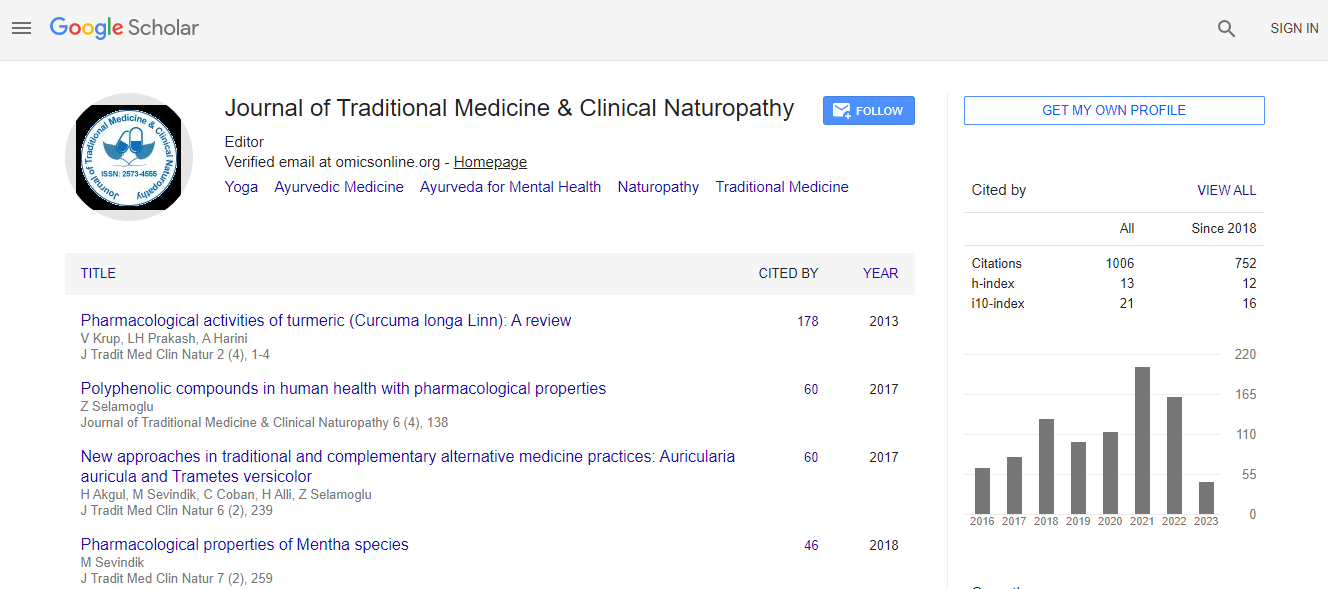Our Group organises 3000+ Global Conferenceseries Events every year across USA, Europe & Asia with support from 1000 more scientific Societies and Publishes 700+ Open Access Journals which contains over 50000 eminent personalities, reputed scientists as editorial board members.
Open Access Journals gaining more Readers and Citations
700 Journals and 15,000,000 Readers Each Journal is getting 25,000+ Readers
Google Scholar citation report
Citations : 1504
Journal of Traditional Medicine & Clinical Naturopathy peer review process verified at publons
Indexed In
- CAS Source Index (CASSI)
- Google Scholar
- Sherpa Romeo
- Open J Gate
- Genamics JournalSeek
- RefSeek
- Directory of Research Journal Indexing (DRJI)
- Hamdard University
- EBSCO A-Z
- Publons
- Geneva Foundation for Medical Education and Research
- Euro Pub
- ICMJE
Useful Links
Recommended Journals
Related Subjects
Share This Page
Acute effect of transcutaneous electrical acupoints stimulation on heart rate recovery after the 3-minute step test
6th International Conference and Exhibition on Traditional & Alternative Medicine
Chai-Yi Chou, Huei-Jhen Wen and Boon Suen Ang
University of Wisconsin-Madison, USA Tzu Chi General Hospital, Taiwan Tzu Chi University, Taiwan Universiti Sains Malaysia, Malaysia
Posters & Accepted Abstracts: J Tradi Med Clin Natur
Abstract
Introduction: Transcutaneous Electrical Acupoint Stimulation (TEAS) is a safe standardized non-invasive therapeutic technique to enhance the heart rate regulation in healthy and cardiovascular disease individuals Purpose: The aim of this study was to assess the acute therapeutic effect of TEAS on recovery heart rate (HR) after exercise. Methods: Forty-one recreationally active college students were recruited and randomly assigned into either TEAS group (TG) or control group (CG). All participants were required to perform two trials of 3-minute step exercise (3MST) wtih a break of 30 minutes between trials. For the TG, participants received 10 minutes TEAS treatment on both forearms at the two selected standard acupoints (Nei-Guan [PC6] and Lie-Que [LU7]) for cardiovascular disease before the second trial, while the CG was seated at rest. HR was measured at rest (HRrest), the first (HR1), second (HR2) and third-minute (HR3) of recovery after 3MST. Mixed-models repeated measures method was used to compare differences between the groups (�± = 0.05). Results: There were no significant difference in HRrest1 and HRrest2 between the first and the second 3MST in both groups, as well as between groups. The caluculated 3MST fitness indexes were no significance different between the pre-treatment and the post treatment in both groups. Conclusion: Although TEAS at PC6 and LU7 has demonstrated it can slowdown the heart rate in tachycardia patients. But in this study, it did not show the effect. We spaculate, the timing and durantion of TEAS treatment may play important role and its machanism on enhencing cardiovascular enhencing need to further investigate.Biography
Chai-Yi Chou earned her MD degree from China Medical University in Taiwan in 2008. She specialized in Acupuncture. After 3 years residency training in Tzu Chi Medical Center, she has experience in treating patients with various diseases, including cardiopulmonary diseases and sports, injuries rehabilitation and recovery. She has great passion and interest in Sports Medicine. She would like to utilize and apply acupuncture in Exercise Science. She is pursuing her MS degree in Exercise Science at Department of Kinesiology in University of Wisconsin-Madison.
Email: chiayichou@gmail.com

 Spanish
Spanish  Chinese
Chinese  Russian
Russian  German
German  French
French  Japanese
Japanese  Portuguese
Portuguese  Hindi
Hindi 
